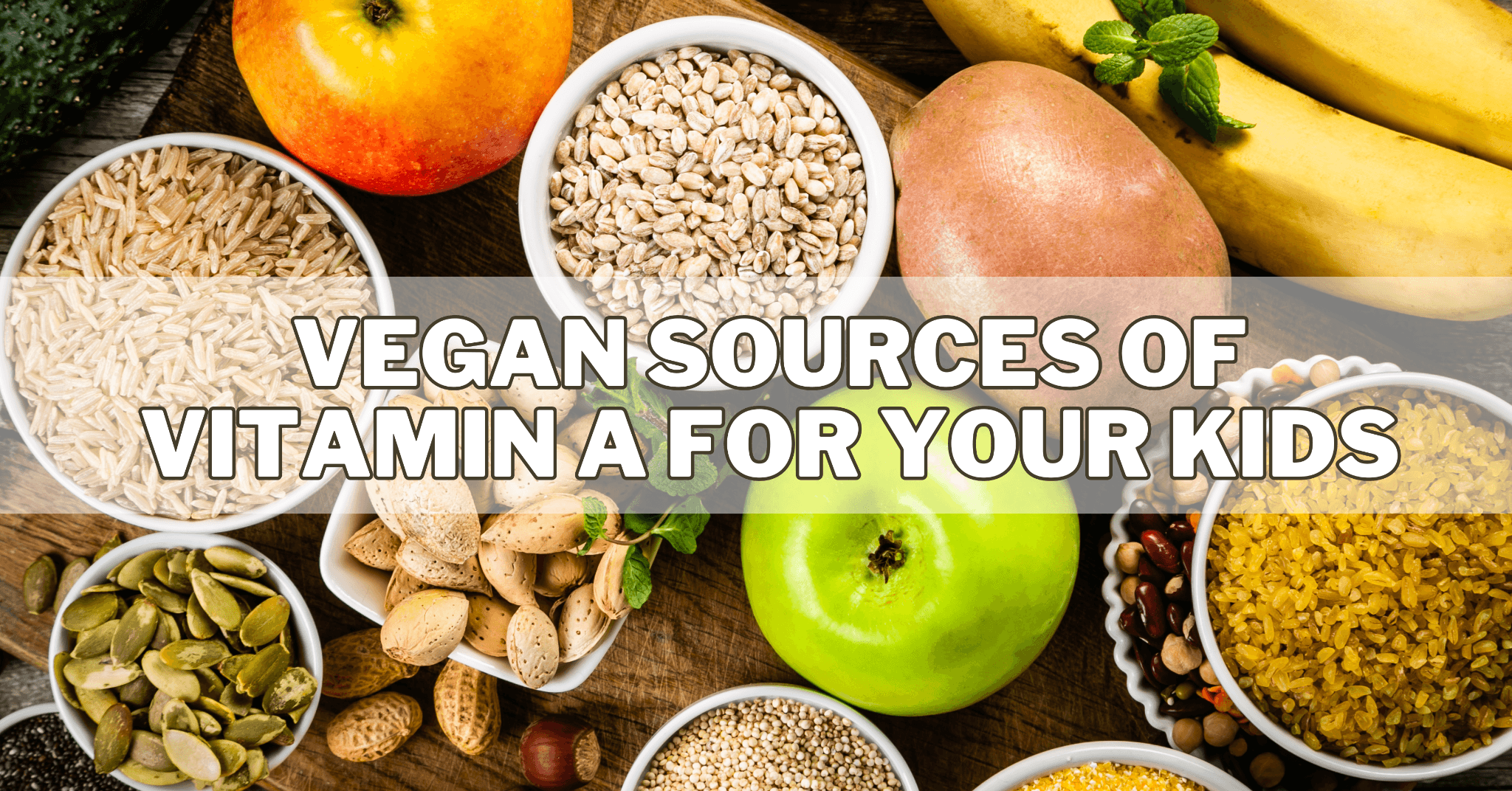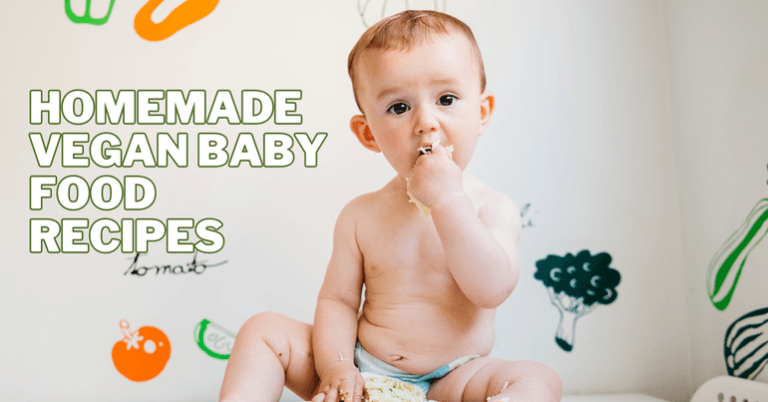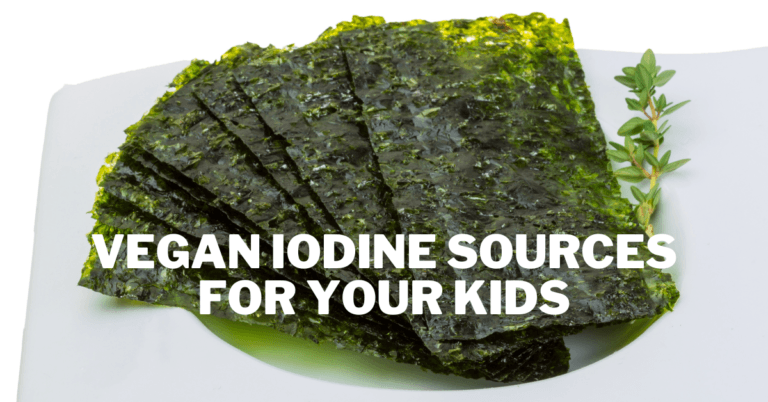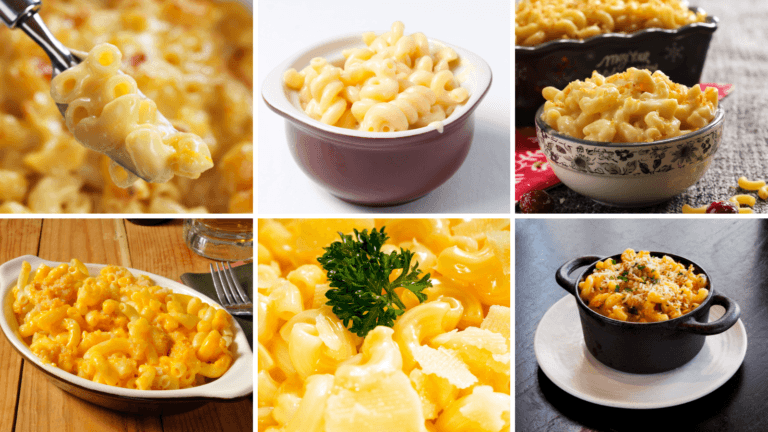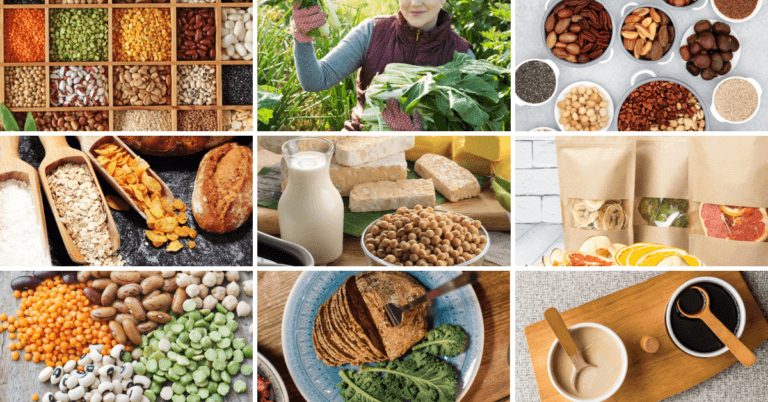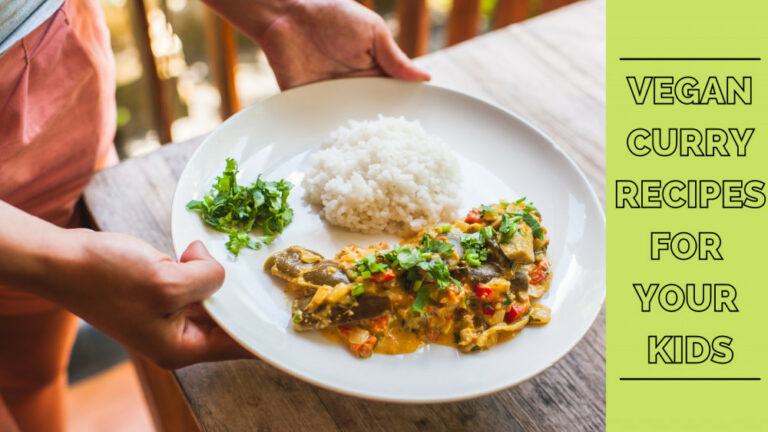Best Vegan Sources Of Vitamin A For Your Kids
Best Vegan Sources Of Vitamin A For Your Kids
Ensuring your child gets enough vitamins on a plant-based diet can feel challenging, but it doesn’t have to be. Vegan sources of Vitamin A are both delicious and easy to incorporate into meals your kids will love.
From vibrant veggies to tasty fruits, this blog explores the best plant-based options to support healthy vision, growth, and immunity—naturally and deliciously.
Health Benefits Of Vitamin A
1. Supports Vision Health
Vitamin A is essential for vision, particularly night vision, through its role in forming rhodopsin. The World Health Organization reports that over 250,000 to 500,000 children go blind each year due to Vitamin A deficiency. It also helps prevent age-related macular degeneration, which affects nearly 196 million people worldwide.
2. Boosts The Immune System
Vitamin A enhances immune function by supporting the skin and mucous membranes, as well as promoting the production of white blood cells.
Studies show that Vitamin A supplementation can reduce mortality from infectious diseases in children under five by up to 24%. It helps the body fight viruses, bacteria, and parasites more effectively.
3. Promotes Cell Growth And Repair
Vitamin A regulates cell division and differentiation, which is crucial for tissue growth and repair. It also supports epithelial tissues, including skin, lungs, and intestines.
Research indicates that Vitamin A deficiency hinders wound healing and tissue regeneration, thereby increasing susceptibility to infections and prolonging recovery from illness or injury.
4. Improves Skin And Hair Health
Vitamin A helps maintain healthy skin by promoting natural oil production and supporting the turnover of skin cells. Dermatological studies have shown that topical retinoids, which are vitamin A derivatives, can reduce acne lesions by up to 70%. It also strengthens hair follicles, reducing dryness, breakage, and scalp issues linked to nutrient deficiencies.
5. Important For Reproductive Health And Development
Vitamin A supports reproductive processes and fetal development. In pregnancy, it helps form the heart, lungs, kidneys, and eyes.
WHO reports that maternal deficiency increases the risk of complications and poor birth outcomes. It's also crucial for male fertility, aiding sperm production and overall testicular function.
6. Supports Bone Health
Vitamin A helps regulate bone remodelling by influencing the activity of osteoblasts and osteoclasts. A balanced intake supports bone density, but excessive intake may increase the risk of fractures.
According to the NIH, low Vitamin A levels are associated with increased osteoporosis risk, especially in postmenopausal women and older adults.
Vegan Vitamin A Sources
Vitamin A is one of the most vital nutrients, and our bodies would suffer if we didn't get enough of it. On the other hand, Vitamin A is not a scarce nutrient because it is found in many fruits and vegetables.
1. Carrots
Carrots are an excellent and delicious source of vitamin A, especially for kids following a vegan diet. A 100-gram serving of raw carrots provides about 41 kcal, 0.9 g of protein, 0.2 g of fat, and 9.6 g of carbohydrates.
Carrots are particularly rich in beta-carotene, which the body converts into active vitamin A. A 100-gram serving contains approximately 835 mcg of vitamin A, which is equivalent to 93% of the recommended daily allowance (RDA).
In a 100-calorie serving (around 244 g), carrots provide approximately 2.2 g of protein, 0.5 g of fat, and 23 g of carbohydrates, along with 2,039 mcg of vitamin A—well over the daily requirement.
Carrots are not only nutritious but also versatile and kid-friendly, perfect for snacks, salads, soups, or blended into smoothies.
Their natural sweetness and crunch make them an enjoyable way to ensure children get enough vitamin A for healthy vision and immune function.
- One hundred grams of carrots provides 835 mcg of vitamin A (93% of the RDA)
- Nutritional content per 100 grams: 41 kcal, 0.9 g of protein, 0.2 g of fat, and 9.6 g of carbohydrates
- A 100-calorie serving (about 244 g) contains 2,039 mcg of vitamin A, exceeding the daily requirement.
- Carrots are versatile and kid-friendly, perfect for snacks, salads, soups, or smoothies.
- Supports healthy vision and immunity, making them an ideal addition to children’s diets.
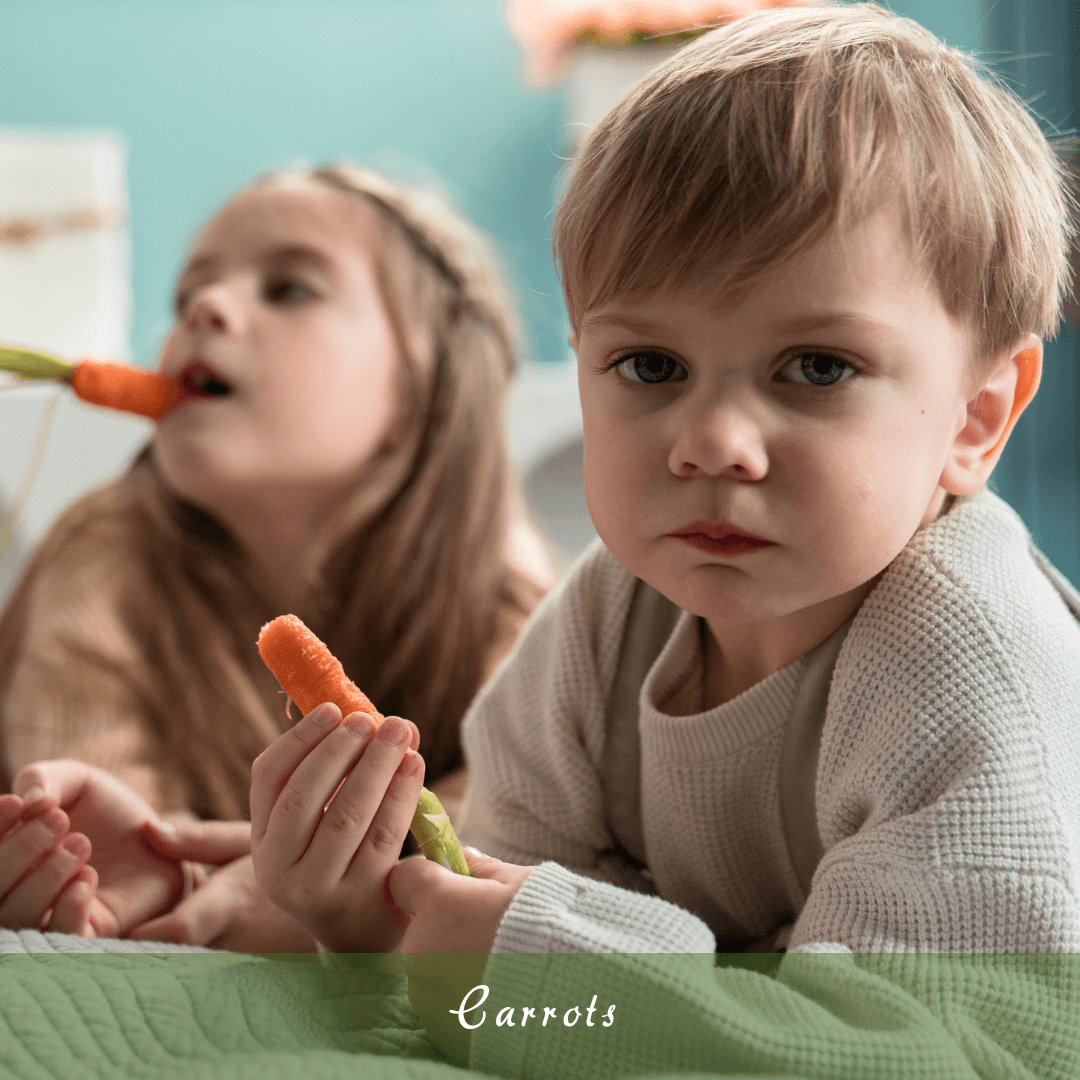
2. Sweet Potatoes
Sweet potatoes are a rich, delicious, and nutritious source of vitamin A, making them an excellent addition to a child’s diet. A 100-gram serving of cooked sweet potato provides about 86 kcal, 1.6 g of protein, 0.1 g of fat, and 20.1 g of carbohydrates.
Sweet potatoes are exceptionally high in beta-carotene, a plant-based compound that the body converts into vitamin A. A 100-gram serving provides approximately 1,085 mcg of vitamin A (121% of the recommended daily allowance), exceeding the daily requirement. In a 100-calorie serving (about 116 g),
Sweet potatoes provide approximately 1,260 mcg of vitamin A (140% of the RDA), 1.9 g of protein, and 23 g of carbohydrates.
They are versatile and can be enjoyed roasted, mashed, or baked into dishes like fries or casseroles. Naturally sweet and full of nutrients, sweet potatoes are a fantastic way to support children’s growth, vision, and immune health.
- One hundred grams of sweet potatoes contains about 1,085 micrograms of vitamin A, or 121% of the recommended daily amount (RDA).
- The nutritional value per 100 grams is 20.1 g of carbohydrates, 0.1 g of fat, 1.6 g of protein, and 86 kcal.
- A 100-calorie serving (approximately 116 g) provides 1,260 mcg of vitamin A, exceeding the daily requirement.
- Sweet potatoes are versatile and can be roasted, mashed, or baked into a variety of dishes.
- High in beta-carotene, they support healthy vision, immune function, and overall growth in children.
3. Kale
Kale is a powerhouse leafy green that provides an abundance of vitamin A, essential for children’s growth and development.
A 100-gram serving of raw kale contains approximately 49 kcal, 4.3 g of protein, 0.9 g of fat, and 8.8 g of carbohydrates. It's particularly high in beta-carotene, which the body converts into vitamin A.
A 100-gram serving of kale provides approximately 241 mcg of vitamin A, which is 27% of the recommended daily allowance, significantly contributing to daily requirements.
In a 100-calorie serving (roughly 204 g), kale provides around 492 mcg of vitamin A (55% RDA), along with 8.8 g of protein and 18 g of carbs.
Kale is also rich in fibre, vitamin K, calcium, and antioxidants, which support bone health, digestion, and overall immune function.
Whether blended into smoothies, sautéed, or added to soups and salads, kale is an excellent way to ensure kids get the vital nutrients they need in their diet.
- Kale is an excellent source of vitamin A, providing approximately 241 mcg per 100 grams, which is 27% of the recommended daily allowance (RDA).
- Nutritional content per 100 grams: 49 kcal, 4.3 g of protein, 0.9 g of fat, and 8.8 g of carbohydrates.
- A 100-calorie serving (approximately 204 g) provides 492 mcg of vitamin A, contributing significantly to daily requirements.
- Kale is rich in fibre, calcium, vitamin K, and antioxidants, which support overall health.
- It can be added to smoothies, salads, soups, or sautéed as a side dish, making it a nutritious addition to kids' meals.
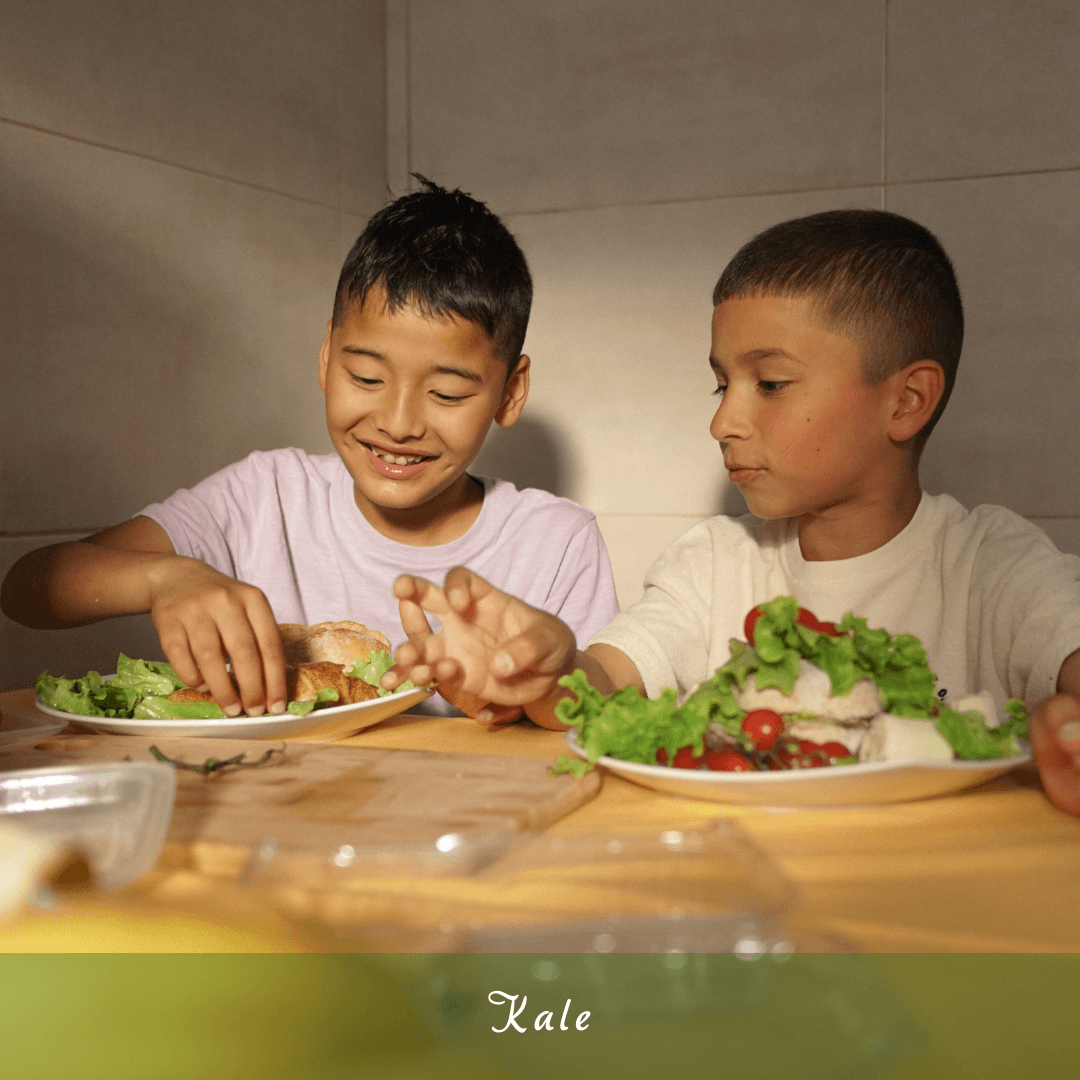
4. Cantaloupes
Cantaloupes are a delicious, kid-friendly fruit that serves as a rich vegan source of vitamin A. Just 100 grams provides about 169 mcg of vitamin A (19% of the RDA), along with 34 kcal, 0.84 g of protein, 0.19 g of fat, and 8.16 g of carbohydrates.
In a 100-calorie serving (approximately 294 g), cantaloupes provide 497.06 mcg of vitamin A (17.65% of the recommended daily allowance), 2.47 g of protein, and 24 g of carbohydrates, making them both nutritious and filling.
Their vibrant orange colour comes from beta-carotene, a powerful antioxidant that supports healthy vision, immune function, and skin.
Naturally sweet and hydrating, cantaloupes are perfect for growing kids and are easy to incorporate into smoothies, fruit bowls, or served fresh as a snack.
For families following a plant-based diet, cantaloupes provide a tasty, low-fat way to boost vitamin A intake naturally.
- Cantaloupe is a refreshing fruit rich in vitamin A, providing approximately 169 mcg per 100 grams (19% of the recommended daily allowance, or RDA).
- Nutritional content per 100 grams: 34 kcal, 0.84 g of protein, 0.19 g of fat, and 8.16 g of carbohydrates.
- A 100-calorie serving (approximately 294 g) provides 497 mcg of vitamin A, which is around 55% of the recommended daily allowance (RDA).
- It’s also a good source of hydration, vitamin C, and antioxidants, supporting skin and immune health.
- Sweet and juicy, cantaloupe is perfect for fruit salads, smoothies, or a refreshing snack kids will love.
5. Butternut Squash
Butternut squash is a flavourful and nutrient-dense vegetable that serves as an excellent vegan source of vitamin A, making it ideal for supporting children's vision, immunity, and overall growth. One hundred grams contains around 12 grams of carbohydrates, 0.1 grams of fat, 1 gram of protein, and 45 kcal.
It contains approximately 532 mcg of vitamin A (59% of the recommended daily allowance), making it one of the richest plant-based sources of this essential vitamin.
In a 100-calorie serving (about 222 g), butternut squash delivers around 1.8 g of protein, 0.22 g of fat, 27 g of carbohydrates, and over 1,180 mcg of vitamin A—exceeding 100% of a child's daily needs.
Its sweetness and smooth texture make it a favourite in soups, purées, or roasted vegetable dishes. Butternut squash is a tasty and rich source of fibre, antioxidants, and essential nutrients, making it a wise and wholesome choice for growing kids on a plant-based diet.
- Butternut squash is an excellent vegan source of vitamin A, providing approximately 532 mcg per 100 grams, which is 59% of the recommended daily allowance (RDA).
- It contains 1 g of protein, 0.1 g of fat, 11.7 g of carbohydrates, and 45 kcal per 100 grams.
- A 100-calorie serving (about 222 g) provides approximately 1,181 mcg of vitamin A, surpassing the daily requirement.
- It is also rich in fibre, vitamin C, and potassium, promoting healthy digestion and immune support.
- Butternut squash can be roasted, mashed, or blended into soups, making it a comforting, kid-friendly addition to meals.

6. Spinach
Spinach is a nutrient-rich leafy green and an excellent vegan source of vitamin A, essential for children's healthy vision, immune system, and cell growth.
A 100-gram serving of raw spinach contains just 23 kcal, 2.9 g of protein, 0.4 g of fat, and 3.6 g of carbohydrates. It provides about 469 mcg of vitamin A (52% of the RDA), making it a powerful plant-based option.
In a 100-calorie serving (around 435 g), spinach offers approximately 1,980 mcg of vitamin A—well over the daily requirement, 12.6 g of protein and 15.6 g of carbohydrates. Spinach is also rich in iron, folate, and vitamin K, which support overall development and energy levels.
Spinach is a simple addition to a child's diet due to its mild flavour and flexibility, whether it is added to salads, smoothies, or cooked into meals. Spinach is a wholesome and straightforward way for plant-based families to boost their daily nutrition.
- Spinach is a powerful plant-based source of vitamin A, providing approximately 469 mcg per 100 grams, which is equivalent to 52% of the recommended daily allowance (RDA).
- Nutritional content per 100 grams: 23 kcal, 2.9 g of protein, 0.4 g of fat, and 3.6 g of carbohydrates.
- A 100-calorie serving (approximately 435 g) provides approximately 2,040 mcg of vitamin A, which is over double the daily requirement.
- Spinach is also rich in iron, folate, and antioxidants, which support energy and immune health.
- It’s easy to add to smoothies, soups, salads, or stir-fries, making it a nutrient-dense choice for kids.

7. Papaya
Papaya is a nutrient-dense tropical fruit that serves as a great vegan source of vitamin A, benefiting children's immune systems and supporting their growth.
A 100-gram serving of raw papaya provides approximately 47 kcal, 0.47 g of protein, 0.26 g of fat, and 11 g of carbohydrates.
It contains approximately 47 mcg of vitamin A (5% of the Recommended Daily Allowance), primarily beta-carotene, which the body converts into active vitamin A.
In a 100-calorie serving (approximately 213 g), papaya provides approximately 100 mcg of vitamin A (11% RDA), 1 g of protein, and 23 g of carbohydrates.
Kids love it for its natural sweetness and soft texture, whether it's served fresh, blended into smoothies or added to fruit salads.
Papaya is also hydrating and supports digestion, making it a wholesome choice for a child's daily diet, especially for families following a plant-based lifestyle.
- Papaya is a sweet, tropical fruit rich in vitamin A, providing approximately 47 mcg per 100 grams, which is 5% of the recommended daily allowance.
- Forty-three kcal, 0.5 g protein, 0.3 g fat, and 10.8 g carbs make up one hundred grams.
- A 100-calorie serving (about 233 g) contains approximately 110 mcg of vitamin A.
- It’s also high in vitamin C, folate, and digestive enzymes like papain, which support gut health.
- Soft, juicy, and naturally sweet, papaya is easy for kids to enjoy fresh, in smoothies, or as part of fruit salads.
8. Tomatoes
Tomatoes, sun-dried, provide 44 mcg of vitamin A per 100g, which is equivalent to 1% of the recommended daily allowance (RDA). Vitamin A in a typical serving size of 1 cup (or 54 g) is 23.76 mcg. This is equivalent to an RDA proportion of 1%.
The percentage of the recommended daily allowance (RDA) for vitamin A is based on an RDA level of 3000 mcg for a mature adult.
Serving size of 0.39 g of sun-dried tomatoes contains 100 calories and 17.05 mcg of Vitamin A. (0.39 percent RDA). Other significant and linked nutrients and macronutrients, such as Fat, are as follows in 100 calories: Protein 5.47 g (9.69% RDA), Fat 1.15 g (1.94% RDA), Carbohydrate 21.61 g (16.67% RDA).
- Sun-dried tomatoes provide about 44 mcg of vitamin A per 100 grams (1% of the RDA).
- Nutritional content per 100 grams: around 258 kcal, 14 g of protein, 2.97 g of fat, and 55.76 g of carbohydrates.
- A 100-calorie serving (approximately 39 g) provides 17.05 mcg of vitamin A (0.57% of the RDA).
- Also rich in antioxidants, such as lycopene, and a good source of fibre, protein, and vitamin C.
- Their tangy flavour makes them great in pasta, salads, or sandwiches—an easy way to add nutrients to meals for kids.
FAQ
Can Kids Get Enough Vitamin A From A Vegan Diet?
Yes, a balanced vegan diet that includes beta-carotene-rich foods, such as carrots and sweet potatoes, can effectively meet children's vitamin A needs.
How Can I Help My Child Absorb More Vitamin A?
Combine beta-carotene-rich foods with healthy fats like avocado, nuts, or olive oil to enhance the absorption of vitamin A in your child’s diet.
Should I Consider Vitamin A Supplements?
If your child is a picky eater or has limited food variety, consult a pediatrician or dietitian before considering vitamin A supplementation.
Are There Signs Of Vitamin A Deficiency I Should Watch For?
Yes, symptoms may include dry eyes, poor night vision, frequent infections, and slow wound healing. Always consult a healthcare provider if you notice these signs.
Conclusion
Ensuring your kids get enough vitamin A is more straightforward than you might think. With a colourful variety of plant-based foods, such as sweet potatoes, carrots, spinach, and mangoes, you can support their health while keeping mealtime fun and nutritious.
Prioritizing these wholesome options will help your children thrive naturally and deliciously on a vegan diet.
I trust you enjoyed this article about the Best Vegan Sources Of Vitamin A For Your Kids. Please stay tuned for more blog posts to come shortly. Take care!
JeannetteZ
>>> Please click here to read my Vegan Travel Guides To World Destinations <<<
>>> Want To Learn How To Create Delicious, Cruelty-Free, Healthy AND 100% Vegan Meals? Try These Awesome Vegan Cooking Courses With A Free 7-DAY MEMBERSHIP<<<
Your Opinion Is Important To Me
Do you have thoughts, ideas, or questions? I would love to hear from you. Please leave me your questions, experiences, and remarks about this article on the Best Vegan Sources Of Vitamin A For Your Kids in the comments section below. You can also email me at Jeannette@LivingTheVeganLifestyle.org.
Here are links to some of my favourite articles:
11 Amazing Vegan Salad Recipes
8 Best Vitamix Blenders Of 2022 – Reviews And Comparison
Best Vegan Restaurants In Bridgetown, Barbados
Best Vegan Restaurants In Dhaka, Bangladesh
10 Easy And Healthy Vegan Fruit Salads

